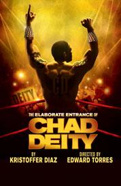Pulitzer Nominee Kristoffer Diaz's Ten Steps to Elaborate Off-Broadway Success
About the author:
This time last year, playwright Kristoffer Diaz was a virtual unknown—though in excellent company as part of Ars Nova’s 2009 playwriting group alongside Annie Baker (Circle Mirror Transformation) and Bekah Brunstetter (Oorah!)—preparing for the world premiere of his newest play, The Elaborate Entrance of Chad Deity, at Chicago’s Victory Gardens Theatre. Cut to May 20, 2010, when Diaz, now a Pulitzer Prize finalist, is front and center as the same show celebrates its off-Broadway debut at Second Stage. The Yonkers native and his remarkable comedy about social stereotypes as seen through the lens of pro wrestling have received a warm welcome from New York audiences. Broadway.com asked this powerful new playwright to give us a play by play on going from everyday wrestling fan to Pulitzer nominee seemingly overnight.
![]()
Ten Things That May or May Not Have Happened But Definitely Contributed to the Journey Towards Opening Night of The Elaborate Entrance of Chad Deity at Second Stage
As you can see, brevity is not one of my strong suits. Especially in titles. I'm also not good at narrowing down what I want to talk about, so here's an attempt to hit the highlights. (One other note: this list does not include my reactions to being named finalist for the Pulitzer Prize, which I've already covered at my blog: kristofferdiaz.wordpress.com—and yes, that was a shameless plug.)
1. Madison Square Garden. I'm six or seven years old. My father and I have just watched a World Wrestling Federation show. Now we're lost as we're trying to leave the building. We find an elevator. It opens. Andre the Giant is standing there. He's big. Unfathomably big. That leaves an impression. (NOTE: this is the one that might not have actually happened. Childhood memory can be faulty. I like to believe that this is a true story though.)
2. 1992. I'm in high school. I'm a baseball player. The season ends, and I've got nothing to do with my Saturdays. I audition for the school play to pass the time. I'm cast in Neil Simon's Plaza Suite. I've got six words of dialogue. I wear orange sneakers onstage. I realize that instead of spending my extracurricular time with groups of male baseball players, I can spend it with female singers and dancers. The decision is easy.
3. Later in 1992. The West Side Theater (one block away from Second Stage, coincidentally). I'm 15. I'm watching John Leguizamo's play Spic-O-Rama. For the first time, I'm watching a theater piece about people who look and sound like me and members of my immediate family. I feel like he's talking directly to me. I know what I want to do with the rest of my life.
4. 1995 to 1999. I'm an undergrad at New York University. I read M. Butterfly by David Henry Hwang. I read Six Degrees of Separation by John Guare. I read Zoot Suit by Luis Valdez. I read that last one over and over. All three plays teach me about fluid dramaturgical structure, the evils of blackouts, and the need to meet media-saturated contemporary theater audiences on their own multi-faceted terms.
5 and 6. Jump way ahead to a pair of unspecified dates. Separate conversations with artistic leaders of major theater companies. Conversation #1 contains the sentence: “The only way I can do two black plays in my season is if one is a musical and one is August Wilson.” The statement makes me uncomfortable. I don't speak up. Conversation #2: “It doesn't matter that we're hiring a salsa band to play on Cinco de Mayo. Our audience won't know the difference." The statement makes me uncomfortable. I don't speak up.
7. At some point, I make a decision to start speaking up.
8. We're up to 2004. World Wrestling Entertainment (the largest professional wrestling company in the world) debuts a character named Muhammad Hassan. I don't have room to write about that here. I highly encourage you to Google the whole controversy. It's the single event that most directly led to the writing of this play. In short: It started out as a promising depiction of the difficulties facing American citizens of Middle Eastern descent in the aftermath of 9/11. It turned into an unfortunate exploitation of blind patriotism and terrorist iconography. From an artistic and entertainment perspective, it was a lost opportunity. For some reason, I wanted to reopen that opportunity for myself.
9. This one comes in three parts: (A) Victory Gardens Theater in Chicago invites me to develop Chad Deity as part of their Ignition Festival of New American plays in the summer of 2008; (B) they invite me back for a full production of the play in the fall of 2009; and (C) people seem to like it. It's my first full production of any play ever. It's instantly the most rewarding theatrical experience of my young career. And it's super fun.
10. Second Stage invites me to bring this silly little wrestling play to New York City. I get to bring my baby home to my friends and family. I'm not really sure how this and (maybe) meeting Andre the Giant on an elevator are two sides of the same timeline...but I kind of think they are.
